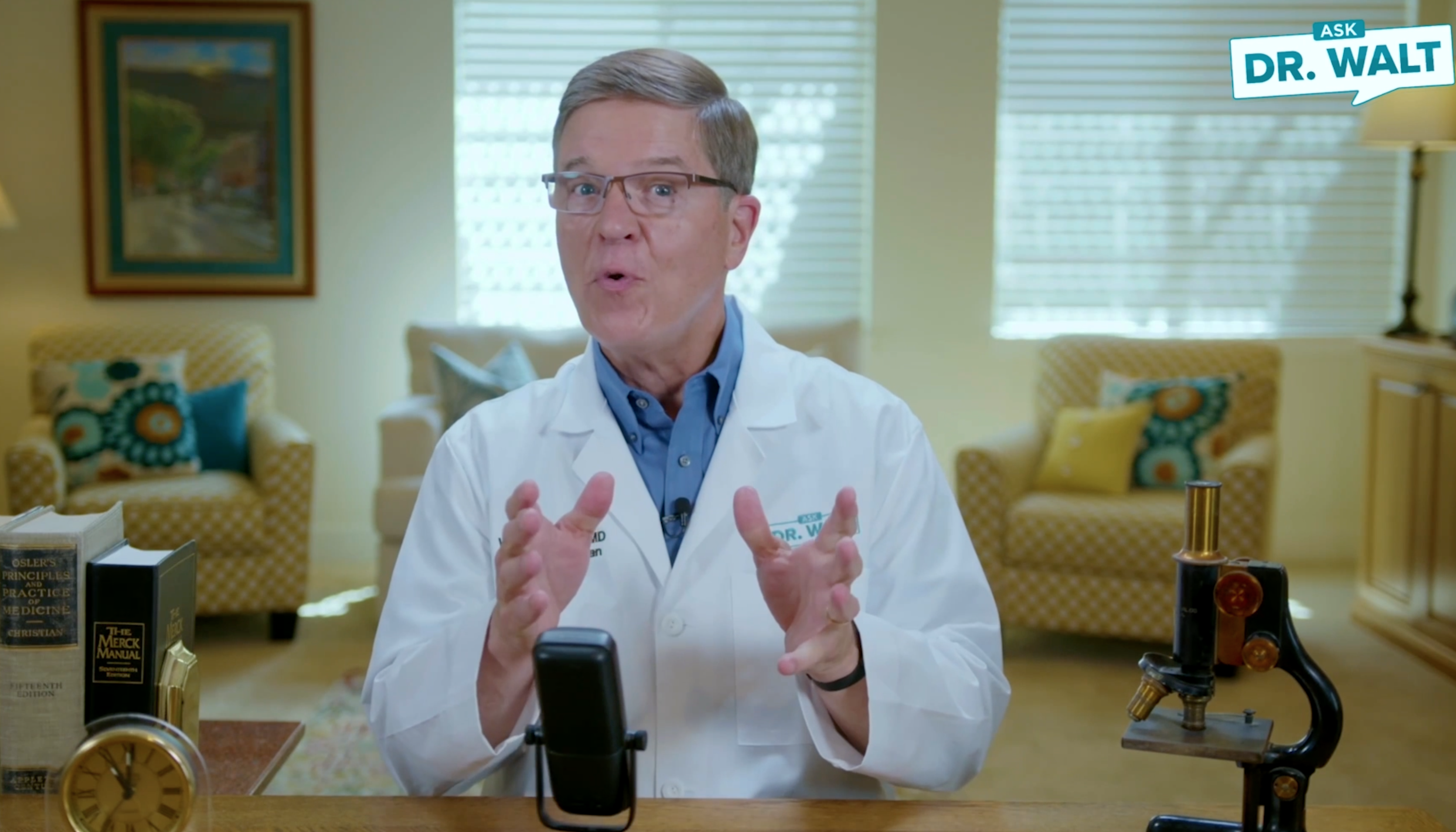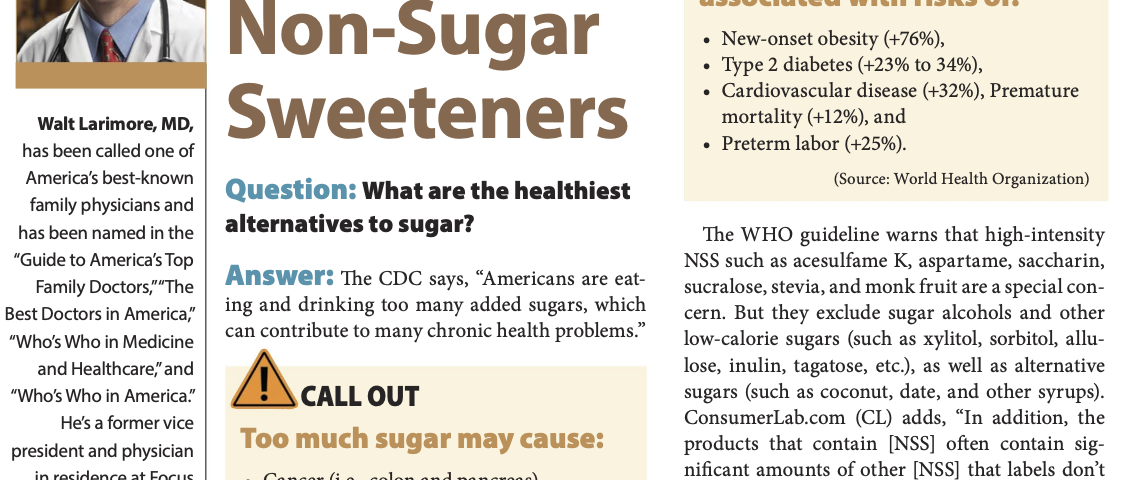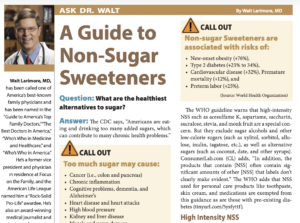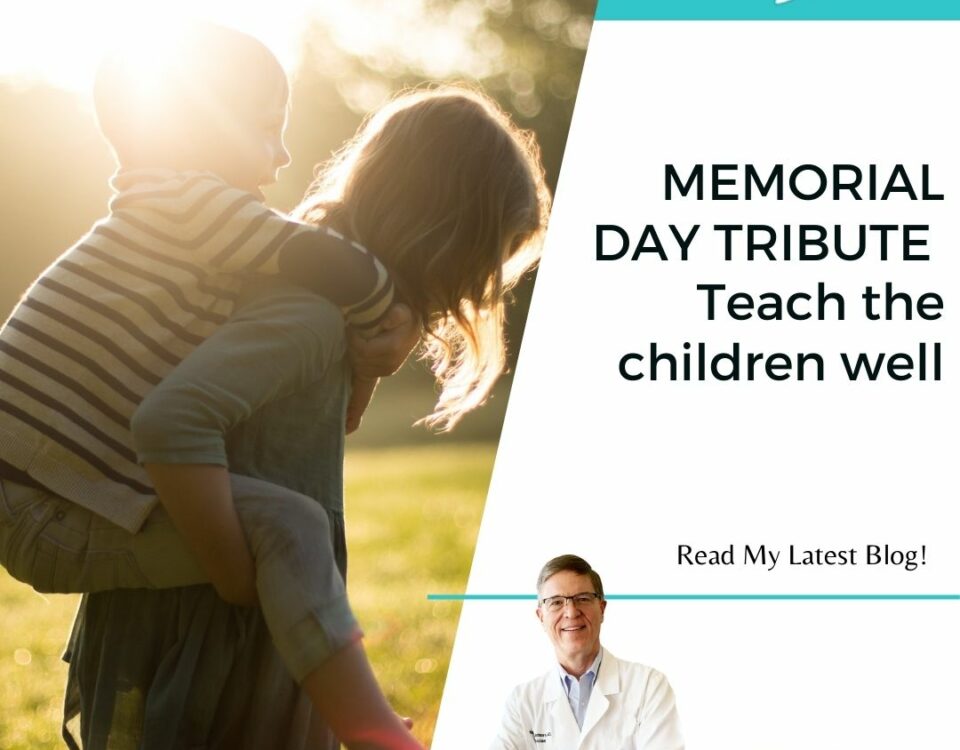
Colorado Springs man discovers father’s WWII story
August 9, 2023
Ask Dr. Walt 15 – Essential # 8 – The essential of discovering your destiny OR How to nurture your hopes and dreams
August 14, 2023I enjoy being able to answer questions from the readers of Today’s Christian Living magazine in my “Ask Dr. Walt” column. In the July 2023 issue, I answered a question about the alternatives to sugar.

CLICK HERE TO READ THE ORIGINAL ARTICLE OR
TO LEARN MORE ABOUT TODAY’S CHRISTIAN LIVING
Non-Sugar Sweeteners
Question: What are the healthiest alternatives to sugar?
Answer: The CDC says, “Americans are eating and drinking too many added sugars, which can contribute to many chronic health problems.”
Too much sugar may cause:
-
- Cancer (i.e., colon and pancreas)
- Chronic inflammation
- Cognitive problems, dementia, and Alzheimer’s
- Heart disease and heart attacks
- High blood pressure
- Kidney and liver disease
- Muscle and nerve damage
- Overeating, overweight, and obesity
- Retina damage
- Skin aging and wrinkling
- Stroke
- Tooth cavities and decay
- Weight gain
Sources: American Heart Association, Harvard University
Sugar substitutes, also called non-sugar sweeteners (NSS) may help you reduce your intake of sugar. Most are promoted as a healthy alternative to sugar and to lower your weight. But are these claims true? And, even more importantly, are NSS safe?
In May 2023, the World Health Organization (WHO) recommended that NSS should not be used to achieve weight control or to reduce the risk of chronic diseases (e.g, cardiovascular disease, cancer, etc.) because of clinical studies that people using them have no long-term weight loss. Furthermore, according to the WHO, observational studies link the use of NSS to several increased health risks.
Non-sugar Sweeteners are associated with risks of:
-
- New-onset obesity (+76%),
- Type 2 diabetes (+23% to 34%),
- Cardiovascular disease (+32%), Premature mortality (+12%), and
- Preterm labor (+25%).
Source: World Health Organization
The WHO Guideline warns that the NSS of concern are the high-intensity sweeteners such as acesulfame K, aspartame, saccharin, sucralose, stevia, and monk fruit, but exclude sugar alcohols and other low-calorie sugars (such as xylitol, sorbitol, allulose, inulin, tagatose, etc.), as well as alternative sugars (such as coconut, date, and other syrups). ConsumerLab.com (CL) adds, “In addition, the products that contain [NSS] often contain significant amounts of other [NSS] that labels don’t clearly make evident.” The WHO adds that NSS that are used in personal care products like toothpaste, skin cream, and medications are exempted from this guidance as are those with pre-existing diabetes (tinyurl.com/5ysfyttf).
Here are some of the major pros and cons from CL (tinyurl.com/bddp7wnp) and CSPI (tinyurl.com/bdh63dja):
High Intensity NSS
- Acesulfame potassium (Ace-K), has been linked with increased cancer risk and tinnitus (ringing in the ears). It can have a bitter taste.
- Aspartame (NutraSweetTM, Equal® – in blue packets in restaurants) is a high-intensity sweeter that is in many popular beverages and soft drinks that has been approved by the FDA since 1981. Although the NCI advises, “There is no evidence that aspartame causes cancer or other serious health problems,” recent studies from France suggest it may be linked with an elevated risk of cancer and heart-related adverse events. CL advises it is, “Linked with increased cancer risk and tinnitus.” CSPI opines, “Try to avoid aspartame, which tops our list of risky artificial sweeteners.”
- Monk fruit (Monk Fruit in the Raw®, PureLo®) is a newer no-calorie sweetener and very few studies have evaluated its safety. It is often combined with low-calorie sweeteners such as erythritol and extracts vary widely in sweetness.
- Neotame (NewtameTM) is a no-calorie artificial sweetener. It is considered safe by CSPI.
- Saccharin (Sweet’N Low®, Sugar Twin®, Necta Sweet® – in pink packets in restaurants) was linked to bladder cancer decades ago. Although the NCI advises there is no evidence that saccharin causes cancer, “due to the availability of alternate, better-tasting sweeteners,” CSPI recommends avoiding it.
- Stevia (Pure Via®, Truvia® – in green packets in restaurants) may satisfy hunger, but may cause mild side effects, and might adversely affect the kidneys. It is not heat stable and many stevia products contain bulking ingredients (which also have a sweet taste), so be sure to read labels carefully. Store stevia away from direct sunlight and heat, as these may affect the taste.
- Sucralose (Splenda® – in yellow packets in restaurants) is a no-calorie heat-stable NSS that has been approved by the FDA since 1998. It may increase blood sugar levels if 6 or more packets are used a day. Although CSPI advises, “Avoid sucralose, which may pose a small risk of cancer,” CL points to a 2022 study of over 100,000 adults in France that were followed for nearly about 9 years that reported sucralose was not linked with increased risk of any type of cancer. However, the study did show a possible link to heart-related adverse events. It’s reassuring that more than 110 other studies have examined the safety of sucralose, and according to the NCI, “There is no evidence that sucralose causes cancer or other serious health problems.”
Low-Calorie Sweeteners (sugar alcohols)
CL writes, “Allulose, erythritol, glycine, inulin, Kabocha extract, lucuma, polydextrose, sorbitol, tagatose, thaumatin (talin), and xylitol are slightly less sweet than table sugar but provide far fewer calories and avoid adverse dental effects.” CSPI advises, “Allulose … appears to be a safer sweetener.” The FDA considers erythritol, sorbitol, and xylitol to be GRAS, although CL points out, “Erythritol and possibly xylitol may be linked with heart-related adverse events.”
Alternative Sugars
CL advises, “There’s no convincing evidence agave syrup, coconut sugar, date syrup, glycerol, honey, maple syrup, trehalose, or yacon syrup, which contain small amounts of vitamins and nutrients, are a healthier alternative since they still contain a significant amount of sugar.” Raw sugar (in the brown packets in restaurants) undergoes minimal processing and retains some molasses, but it is still over 95% pure sugar, and it has no particular health benefits.
Are sugar substitutes safe for children? Are there others who should avoid them?
“Based on the available evidence, which is relatively limited,” CSPI advises, “Children [should] avoid no- or low-calorie sweeteners.” The American Academy of Pediatrics warns that the long-term safety of no-calorie sweeteners has not been assessed in children. The American Heart Association says it is prudent to advise against prolonged consumption of low-calorie sweetened beverages by children. Finally, due to a risk of botulism, infants should never be given honey.
If you are a diabetic, have cardiovascular disease, have phenylketonuria (PKU), or are a woman who is breastfeeding, pregnant, or planning to get pregnant, check with your physician about which if any sugar substitutes you should consider.
Those who should not use sugar substitutes before checking with a doctor:
-
- Infants should never be given honey due to a risk of botulism
- Children
- People with phenylketonuria (PKU)
- Women who are breast feeding, pregnant, of planning to get pregnant
- Adults with diabetes or cardiovascular disease
- Adolescents or adults who are overweight or obese
Sources: American Academy of Pediatrics, American Heart Association, Center for Science in the Public Interest
Mayo Clinic points out, “Research is looking at long-term use of sugar substitutes and the gut – focusing on how the gut and brain communicate. Researchers are checking to see if sugar substitutes affect cravings for sweets, the way people feel hunger and how the body manages blood sugar.”
For the average American, diet sodas and other artificially sweetened beverages (including coffee, tea, energy, or sports drinks) are the single biggest source of artificial sweeteners. Mayo Clinic advises, “In general, it is safest to take in small amounts of sugar substitutes. And it’s best to use sugar substitutes for a short time, or just occasionally. So, try to cut back if you use them a few times a day.”
The Bottom Line
The WHO advises that you “consider other ways to reduce free sugars intake, such as consuming food with naturally occurring sugars, like fruit, or unsweetened food and beverages. NSS are not essential dietary factors and have no nutritional value. People should reduce the sweetness of the diet altogether, starting early in life, to improve their health.”
A Harvard researcher advises, “For people who have a hard time giving up sweet drinks, using an artificially sweetened beverage can be like a nicotine patch is to smoking: Better than the real thing but best considered as a bridge to water, tea, or coffee.”
If you drink artificially sweetened beverages daily, consider switching to:
- Plain tap or bottled water
- Flavored water (i.e., watermelon, blackberry, and mango)
- Water with a slice of fruit, cucumber, sprig of mint, or herbs
- Sparkling water
- Carbonated water (i.e., Polar Seltzer®, LaCroix®)
- Unsweetened, flavored water (i.e., JUST® or Hint®)
Sources: CSPI, Mayo Clinic
Walt Larimore, MD, has been called one of America’s best-known family physicians and has been named in the “Guide to America’s Top Family Doctors,” “The Best Doctors in America,” “Who’s Who in Medicine and Healthcare,” and “Who’s Who in America.” He’s a former Vice President and Physician in Residence at Focus on the Family and the American Life League has named him a “Rock-Solid Pro-Life” awardee. He’s also an award-winning medical journalist and the best-selling author of over 40 books. He and his wife of nearly 50 years, Barb, have two adult children and reside in Colorado Springs. You can follow Dr. Walt at www.DrWalt.com and on Facebook at “DrWalt.com”. Have questions for Dr. Walt? Email them to editor@todayschristianliving.org.
© Copyright WLL, INC. 2023. This blog provides healthcare tips and advice that you can trust about a wide variety of general health information only and is not intended to be a substitute for professional medical advice, diagnosis, or treatment from your regular physician. If you are concerned about your health, take what you learn from this blog and meet with your personal doctor to discuss your concerns.





